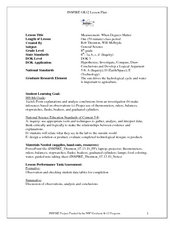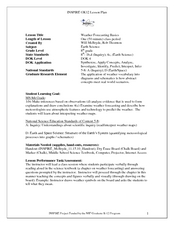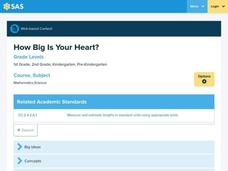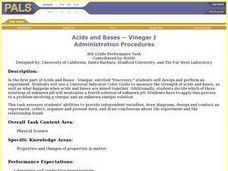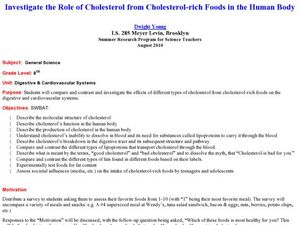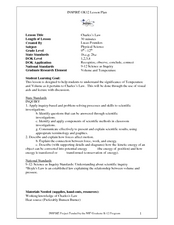Curated OER
Measurement: When Degrees Matter
Eighth graders record the temperature change of the beakers. In this general science lesson, 8th graders create their own data table for recording observations. They discuss experimental results and cite real life applications.
Curated OER
Weather Forecasting Basics
Eighth graders analyze weather diagrams and weather maps. In this earth science instructional activity, 8th graders explain why it is important to know the weather. They complete a handout at the end of the instructional activity.
Curated OER
Cycles Review
Eighth graders discuss the four major cycles of matter. For this general science lesson, 8th graders decide which of the four is the most important. They share their opinion in class.
Curated OER
How Big Is Your Heart?
Students complete a performance about the heart. In this heart lesson plan, students learn about the heart functions and then perform them.
Curated OER
Auburn Cord Dusenberg Field Trip
Fifth graders compare two different vehicles and determine why the cars are designed differently. They write four facts learned from the field trip in their science journals including a fact about how force affects the performance of the...
Curated OER
Mineral Lab
Eighth graders examine the physical properties of different minerals. In this earth science lesson, 8th graders explain the uses of minerals in their daily lives. They complete the mineral identification table during the lesson.
Curated OER
Acids And Bases -- Universal Indicator
Eighth graders design and perform an experiment that uses a Universal Indicator Color Guide to measure the strength of acids and bases. They also determine happens when acids and bases are mixed together. They decide which of three...
Curated OER
Drums and Sound
Through discussion, demonstration, and observation of
performances by drum groups, students discover how vibrations
create sounds. Through exploration students can infer that when drums are struck they make noise due to vibrations.
Curated OER
Weather Elements and Instruments
Eighth graders identify the different weather elements. In this earth science lesson, 8th graders explain the difference between relative humidity and dew point. They discuss the different instruments used to predict weather.
Curated OER
Work Made Easy
Second graders maneuver placement of the fulcrum on the lever to see how to lift weight most easily. They role-play as archaeologists with the task of lifting a heavy rock from the dig site. They write in science journals about what...
Curated OER
Pulse
Students determine a baseline pulse rate then chart the changes in rate with exercise. They describe the changes and develop a rationale for their observations. The task assesses students' abilities to make simple observations, determine...
Curated OER
Alternative Energy
Students identify the five major alternative energy sources. In this physical science instructional activity, students assess the advantages and disadvantages for each type of energy. They complete a concept map using information they...
Curated OER
Investigate the Role of Cholesterol from Cholesterol-rich Foods in the Human Body
Eighth graders assess fat content of different food samples. In this biology lesson, 8th graders create a flowchart showing the transport of cholesterol in the bloodstream. They perform tests for the presence of lipids on food samples.
Curated OER
Charles’s Law
High schoolers describe the relationship between temperature and volume. In this chemistry lesson, students perform an experiment and record their their results. They use Charles' law to explain their observations.
Curated OER
Saturn Flip
Students work together to create a presentation on Saturn. They use the internet to gather information and must include illustrations. They create an assessment to give to their classmates after their presentation.
Curated OER
The Uses of Trees
Students read and show how to perform leaf rubbing's as a class and individually. Students artistic sides are demonstrated within this lesson plan. Students correlate a variety of learning styles.
Curated OER
How Do You Know There is Air in a Bag?
Fourth graders explore air as a material substance. Through experimentation and discussion, they explore how air can be classified as a material substance. Students write three examples proving that air is a material substance in their...
Curated OER
The Catepillar Song
Pupils remember the orderly changes of a butterfly by performing physical motions to a song.
Curated OER
Geology of Yosemite
Learners are shown slides of Yosemite and explore how the valley was formed by performing an experiment. Instructions on how to set up the lab are included. They can be assessed orally or by writing a report on the outcome of the lab.
Curated OER
The Seasons of the Year Expressed in Art
Students explore a variety of works of art to discover the relationships and common themes that connect math, science, and technology. Several pieces of the work of Thomas Cole are examined and linked to the four seasons.
Curated OER
Farming Fantastic Friends
Seventh graders demonstrate scientific inquiry to design and perform an experiment involving Grow Creatures. They participate in a class discussion, and in small groups design an experiment that determines how to change the materials to...
Curated OER
Habitats: Rainforest
Pupils use the internet to find reasons the rainforest is endangered and ways that affects the rest of the world. They read for information, perform experiments, locate rainforests on maps, and write about this ecosystem.
Curated OER
Sea Floor Spreading II
Students import ocean bathymetry data from text files. They then graph these observations along with model predictions to assess the model's ability to simulate observed topographic features of the North Atlantic. Students use Excel to...
Curated OER
Sea Floor Spreading II
Students import ocean bathymetry data form either the topex web site or text files. They then graph these observations along with model predictions to assess the model's ability to sumulate the observed topographic features of the North...


